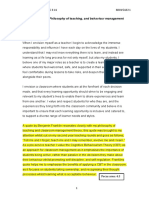Philosophy of Classroom Management
Philosophy of Classroom Management
Uploaded by
Kate KlassenCopyright:
Available Formats
Philosophy of Classroom Management
Philosophy of Classroom Management
Uploaded by
Kate KlassenOriginal Description:
Copyright
Available Formats
Share this document
Did you find this document useful?
Is this content inappropriate?
Copyright:
Available Formats
Philosophy of Classroom Management
Philosophy of Classroom Management
Uploaded by
Kate KlassenCopyright:
Available Formats
Running Head: PHILOSOPHY OF CLASSROOM MANAGEMENT
My philosophy of classroom management is focused around the success of my
students. I consider my philosophy holistic in nature because I am committed to
providing my students with the best emotional support and educational guidance
possible. This support and guidance stems from the Teaching Quality Standards
document as well as two classroom management models. Additionally, my philosophy
aligns with the referent and reward/coercive authority bases. Finally linking all these
aspects together with the student directed management theory. The elements I have
chosen from the Teaching Quality Standards, classroom management models, authority
bases, and management theories, marry well together- which is confirmation of a
holistic approach.
The Teaching Quality Standards document states the purpose of classroom
management in relation to education. Part of my personal philosophy of classroom
management is structured on two elements found in the Teaching Quality Standardsthe first being: Students needs for physical, social, cultural and psychological security.
They know how to engage students in creating effective classroom routines. They know
how and when to apply a variety of management strategies that are in keeping with the
situation, and that provide for minimal disruptions to students learning (Teaching
Quality Standard, 1997). I have learnt through observing and volunteering in
elementary classes that it is essential to set routines so that students feel safe and
comfortable in the classroom. It is only when students feel a sense of physical, social,
cultural, and psychological security, will the fun of real learning take place. The second
element is the importance of respecting students human dignity. They know how to
establish, with different students, professional relationships that are characterized by
PHILOSOPHY OF CLASSROOM MANAGEMENT
2
mutual respect, trust and harmony (Teaching Quality Standard, 1997). Building and
maintaining positive relationships with my students is my number one goal. I have seen
through my own teaching experiences and through those I have studied and observed,
that the most learning takes place when there is a respectful relational foundation
between the student and teacher and students and their peers. My goal is to create a
safe community within my classroom that promotes healthy relationships.
My philosophy is also based on several models of classroom management that
relate to the Teaching Quality Standards. Theorist Carolyn Evertson and Alene Harris
created a model of classroom management called Modeling learner centered
classrooms (Manning & Bucher, 2012, p. 212) . The premise of this management
technique is that I would start the year with a clear set of rules and expectations and my
classroom would be learner centered. Effective communication with my students is key
in order to maintain good classroom management. Clearly laying out the students
responsibilities, especially emphasizing responsibility for their decisions, actions, and
learning, will lay a firm foundation for their success throughout the year. I will promptly
deal with misbehaviours so they do not spread and make sure to be quick on my feet so
I do not have the same punishment for each misbehaviour. Some techniques I will use
to address misbehaviours will be using physical proximity, maintaining eye contact,
reminding student of appropriates behaviour, and providing needed assistance.
Another model is cooperative discipline and the theorist, Linda Albert, said that
educators should influence rather than control students. Helping students to connect,
contribute, and become capable, educators develop a conduct code that fosters a
positive climate in the school (Manning & Bucher, 2012, p. 212). My role as a teacher is
PHILOSOPHY OF CLASSROOM MANAGEMENT
3
to facilitate the best learning environment possible and I can do this through
administering Alberts three Cs. Connecting with my students is my number one goal.
My aim is to discover their passions, desires, dreams, things that make them tick, and
things that tick them off. It is important to me that each of my students know that I see
them as valued, unique, and beautiful individuals. I will not only create this relationship
with my students but also between my students. Middle school students hold their peers
in the highest regard so it is essential that I create a community where students support
one another. When my students feel supported by me and their classmates, they then
have a safe environment to contribute their thoughts and ideas. In this environment
students will be then be capable to speak without fear of punishment or embarrassment.
Through practising Alberts three Cs, I will influence my students behaviour, not control
them.
In the textbook Principles of Classroom Management, there are four different
teacher authority bases listed- referent, expert, legitimate, and reward/coercive. This
textbook states that Although teachers likely use each of the four types of authority at
some time or another, most tend to have a dominant authority base (Levin, Kerr, Elliott,
& Bajovic, 2015, p. 98). My philosophy of classroom management is referent and
reward/coercive based. I chose referent because I want my students to know I care
about them each individually and that I want to build relationships. My desire is that my
students will like me as a person and therefore misbehaviour will be minimized. I also
chose reward/coercive because I love to celebrate and encourage the best in people. It
is important to me to call out and recognize the good my students do and reward them
for it. I find that there is a balance between referent and reward/coercive because they
PHILOSOPHY OF CLASSROOM MANAGEMENT
4
are on opposite sides of need for teacher involvement. My hope with this is that with
these two opposite authority bases, I will be able to maximize student engagement and
minimize misbehaviours.
My philosophy of classroom management is also based on the student-directed
theory. My goal is to build a caring community that focuses on self direction. Students
will have the primary responsibility for controlling their behaviour and will be capable of
doing so when given the opportunity. Basing my classroom on this theory will prepare
my students to live in a democracy, ultimately setting them up for success in real world.
My students will also be given the responsibility of determining the classroom
environment. The most beneficial aspect of this will be the integration of class meetings
where students determine the agenda. This will foster a deeper sense of community
and reveal the benefit of respectful and caring interactions.
My philosophy of classroom management is focused around the success of my
students. It is holistic in nature because I am committed to providing my students with
the best emotional support and educational guidance. This support and guidance stems
from elements in the Teaching Quality Standards document, classroom management
models, referent and reward/coercive authority bases, and a student directed classroom
management theory. A student's need for security and routines will be met through the
managing learner centered classrooms in which I will set clear expectations and
responsibilities at the beginning of the year. Also respecting students human dignity and
building relationships will be met through cooperative discipline where I will create an
environment where students can connect, contribute, and become capable. My
authority base will be focused around referent and reward/coercive models. This will
PHILOSOPHY OF CLASSROOM MANAGEMENT
5
create a balance between the need for my management intervention of student
behaviour. My philosophy of classroom management is finally tied together with a
student directed approach where there will be a focus on creating a democratic
environment and students will build a respectful community with one another to achieve
the highest level of learning.
References:
Alberta Education. (1997). Teaching Quality Standard Applicable to the Provision
of Basic Education in Alberta. Retrieved from
https://education.alberta.ca/department/policy/standards/teachqual.aspx
Manning, M. L., & Bucher, K. T. (2012). Teaching in the Middle School (Fourth
ed., pp. 212-213). Boston, MA: Pearson.
PHILOSOPHY OF CLASSROOM MANAGEMENT
6
Levin, J., Nolan, J. F., Kerr, J. W., Elliott, A. E., & Bajovic, M. (2015). Principles of
Classroom Management (Fourth ed., pp. 95-119). Toronto, Canada: Pearson.
You might also like
- A Culture of Agency: Fostering Engagement, Empowerment, Identity, and Belonging in the Early YearsFrom EverandA Culture of Agency: Fostering Engagement, Empowerment, Identity, and Belonging in the Early YearsNo ratings yet
- Teaching With Student Texts: Essays Toward an Informed PracticeFrom EverandTeaching With Student Texts: Essays Toward an Informed PracticeRating: 2 out of 5 stars2/5 (1)
- Educational Leadership: a Student-Centered ApproachFrom EverandEducational Leadership: a Student-Centered ApproachNo ratings yet
- Leadership Skills: Middle School Manual: Violence Prevention ProgramFrom EverandLeadership Skills: Middle School Manual: Violence Prevention ProgramNo ratings yet
- The Original Learning Approach: Weaving Together Playing, Learning, and Teaching in Early ChildhoodFrom EverandThe Original Learning Approach: Weaving Together Playing, Learning, and Teaching in Early ChildhoodNo ratings yet
- Lesson Design for a Digital Age: How to Utilize Technology and Inquiry to Transform your TeachingFrom EverandLesson Design for a Digital Age: How to Utilize Technology and Inquiry to Transform your TeachingNo ratings yet
- Magic Capes, Amazing Powers: Transforming Superhero Play in the ClassroomFrom EverandMagic Capes, Amazing Powers: Transforming Superhero Play in the ClassroomNo ratings yet
- Early Child Education: Making Programs Work for Brazil's Most Important GenerationFrom EverandEarly Child Education: Making Programs Work for Brazil's Most Important GenerationRating: 4 out of 5 stars4/5 (1)
- Raising Bright Sparks: Book 2 -Teaching Gifted StudentsFrom EverandRaising Bright Sparks: Book 2 -Teaching Gifted StudentsNo ratings yet
- Empowering Parents & Teachers: How Parents and Teachers Can Develop Collaborative PartnershipsFrom EverandEmpowering Parents & Teachers: How Parents and Teachers Can Develop Collaborative PartnershipsNo ratings yet
- Courageous Journeys in Education: The Ecl Foundation and Netherfield Primary and Pre-SchoolFrom EverandCourageous Journeys in Education: The Ecl Foundation and Netherfield Primary and Pre-SchoolNo ratings yet
- Working Well with Babies: Comprehensive Competencies for Educators of Infants and ToddlersFrom EverandWorking Well with Babies: Comprehensive Competencies for Educators of Infants and ToddlersNo ratings yet
- Cassandra's Classroom Innovative Solutions for Education ReformFrom EverandCassandra's Classroom Innovative Solutions for Education ReformNo ratings yet
- Access to Life Science: Investigation Starters for Preschool, Kindergarten and the Primary GradesFrom EverandAccess to Life Science: Investigation Starters for Preschool, Kindergarten and the Primary GradesNo ratings yet
- Universal Design for Learning: Principles, Framework, and PracticeFrom EverandUniversal Design for Learning: Principles, Framework, and PracticeRating: 2 out of 5 stars2/5 (1)
- Early Childhood Education Leadership in Times of Crisis: International Studies During the COVID-19 PandemicFrom EverandEarly Childhood Education Leadership in Times of Crisis: International Studies During the COVID-19 PandemicElina FonsénNo ratings yet
- Cultivating Exceptional Classrooms; Unmasking Missing Links to Achieve Quality EducationFrom EverandCultivating Exceptional Classrooms; Unmasking Missing Links to Achieve Quality EducationRating: 5 out of 5 stars5/5 (1)
- Finger Plays and Independent Learning: Experiences Leading to Optimum Brain Development Within the Young ChildFrom EverandFinger Plays and Independent Learning: Experiences Leading to Optimum Brain Development Within the Young ChildNo ratings yet
- Hear Our Voices!: Engaging in Partnerships that Honor FamiliesFrom EverandHear Our Voices!: Engaging in Partnerships that Honor FamiliesNo ratings yet
- Education for a Civil Society: Teaching Young Children to Gain Five Democratic Life Skills, Second EditionFrom EverandEducation for a Civil Society: Teaching Young Children to Gain Five Democratic Life Skills, Second EditionNo ratings yet
- Philosophy of Classroom ManagementDocument7 pagesPhilosophy of Classroom ManagementKate KlassenNo ratings yet
- Standard 6Document7 pagesStandard 6api-519224747No ratings yet
- My Classroom Management Philosophy Jessica DunnDocument6 pagesMy Classroom Management Philosophy Jessica Dunnapi-309955119No ratings yet
- Final Copy of PhilosophyDocument6 pagesFinal Copy of Philosophyapi-533449611No ratings yet
- Dore Cohen Teaching PhilosophyDocument4 pagesDore Cohen Teaching Philosophyapi-484775084No ratings yet
- Management Philosophy - Shakima Alphonse - EDU306 Assignment1Document6 pagesManagement Philosophy - Shakima Alphonse - EDU306 Assignment1Shakima AlphonseNo ratings yet
- Philosophy of Classroom Management Draft 1Document3 pagesPhilosophy of Classroom Management Draft 1api-301352603No ratings yet
- 2022 My PP FileDocument14 pages2022 My PP FileShah ShamsNo ratings yet
- ELM 250 My Personal Classroom Management PlanDocument26 pagesELM 250 My Personal Classroom Management PlanChristy KaluhiokalaniNo ratings yet
- Classroom Management ProjectDocument26 pagesClassroom Management Projectmollycypert100% (1)
- Teaching PhilosophyDocument3 pagesTeaching Philosophyapi-269520083No ratings yet
- Personal Philosophy of Classroom ManagementDocument5 pagesPersonal Philosophy of Classroom Managementapi-349059441No ratings yet
- Ed 327 Paper 2Document6 pagesEd 327 Paper 2api-665170814No ratings yet
- Standard 4Document13 pagesStandard 4api-445987478No ratings yet
- Cognitive, Emotional, Social and Physical Needs Are Being Met" (P. 3) - The Sense of WellDocument2 pagesCognitive, Emotional, Social and Physical Needs Are Being Met" (P. 3) - The Sense of WellChi Raymond TumanjongNo ratings yet
- Philosophy of Classroom Management 18918928 2h 2017Document24 pagesPhilosophy of Classroom Management 18918928 2h 2017api-356533687No ratings yet
- Assessment Three Edac WeebsDocument12 pagesAssessment Three Edac Weebsapi-316782488No ratings yet
- Kyle Sutton Classroom Environment PlanDocument13 pagesKyle Sutton Classroom Environment Planapi-650557780No ratings yet
- Alignment of Management Philosophy Theory PlanDocument8 pagesAlignment of Management Philosophy Theory Planapi-357949761No ratings yet
- My Concept of LearningDocument4 pagesMy Concept of Learningapi-352881693No ratings yet
- TRPR 2 POE Sem 2Document11 pagesTRPR 2 POE Sem 2eskaykhan11No ratings yet
- Educational Philosophy 2021Document1 pageEducational Philosophy 2021api-173287898No ratings yet
- Edf Teaching PhilosophyDocument2 pagesEdf Teaching Philosophyapi-237009452No ratings yet
- Comprehensive Examination in Advanced Educational PsychologyDocument5 pagesComprehensive Examination in Advanced Educational PsychologyKaela Lor100% (2)
- Classroom Management PlanDocument5 pagesClassroom Management Planapi-331581537No ratings yet
- Belief StatementDocument5 pagesBelief Statementapi-288345162No ratings yet
- Interview-QuestionsDocument7 pagesInterview-QuestionsaprillabartineNo ratings yet
- Classroom Management PlanDocument5 pagesClassroom Management Planapi-331573623No ratings yet
- Cox, Brandon - Final Assessment - EDSC 344Document5 pagesCox, Brandon - Final Assessment - EDSC 344BrandonNo ratings yet
- Domain 2 Writing PieceDocument2 pagesDomain 2 Writing Pieceapi-539335820No ratings yet
- Philosophy of Classroom Management by Matthew Cooke 17299158Document17 pagesPhilosophy of Classroom Management by Matthew Cooke 17299158api-355488205No ratings yet
- Ued 495-496 Palmieri Scarlett Classroom and Behavior ManagementDocument6 pagesUed 495-496 Palmieri Scarlett Classroom and Behavior Managementapi-380957472100% (1)
- Book Club: "Future Worlds" Grade 7Document20 pagesBook Club: "Future Worlds" Grade 7Kate KlassenNo ratings yet
- Social Studies 8 Lesson PlanDocument3 pagesSocial Studies 8 Lesson PlanKate KlassenNo ratings yet
- Kagan Structures Part II: Which Structure Is The Best Fit?Document1 pageKagan Structures Part II: Which Structure Is The Best Fit?Kate KlassenNo ratings yet
- Philosophy of Classroom ManagementDocument7 pagesPhilosophy of Classroom ManagementKate KlassenNo ratings yet
- Kate Klassen: EducationDocument3 pagesKate Klassen: EducationKate KlassenNo ratings yet
- Lean Principles in Software Development: A Literature ReviewDocument6 pagesLean Principles in Software Development: A Literature ReviewBrawlstars BalNo ratings yet
- Renal Pathology-Mreh 32104: Disorders of KidneyDocument3 pagesRenal Pathology-Mreh 32104: Disorders of KidneyArvinth Guna SegaranNo ratings yet
- Defense Multi 2DDocument2 pagesDefense Multi 2Darunk6No ratings yet
- Term Paper Ghost WriterDocument4 pagesTerm Paper Ghost Writeraflstfcap100% (1)
- DLL Politics Q1 Week 4Document10 pagesDLL Politics Q1 Week 4Ricky Canico ArotNo ratings yet
- The Impact of Social Media Content On Employer Branding in Startup Companies in IndonesiaDocument12 pagesThe Impact of Social Media Content On Employer Branding in Startup Companies in IndonesiaManika JainNo ratings yet
- 2a Sogex ProfileDocument51 pages2a Sogex ProfileVuthpalachaitanya KrishnaNo ratings yet
- Eathena SQLDocument7 pagesEathena SQLBudi SudarsonoNo ratings yet
- Reading Food Labels: Heinz-Christopher U. ElordeDocument14 pagesReading Food Labels: Heinz-Christopher U. ElordeRamon GasgasNo ratings yet
- Steps Involved in Capstone ProjectDocument13 pagesSteps Involved in Capstone ProjectNipul BafnaNo ratings yet
- School Management System Project Report in JavaDocument2 pagesSchool Management System Project Report in JavaRoyet Gesta Ycot Camay0% (1)
- Reinforcekit Beam Fiche TechniqueDocument24 pagesReinforcekit Beam Fiche TechniqueAmel RADJEFNo ratings yet
- Boats and Streams - Aptitude Test Tricks, Formulas & ShortcutsDocument5 pagesBoats and Streams - Aptitude Test Tricks, Formulas & Shortcutshoney1002No ratings yet
- Mk301a ManDocument4 pagesMk301a Manahmad_wazierNo ratings yet
- Moon - Saturn Aspects in The Natal ChartDocument8 pagesMoon - Saturn Aspects in The Natal ChartsaranottenNo ratings yet
- Chap 1Document6 pagesChap 1Vuong Hoang Ngoc My (K18 HCM)No ratings yet
- Ishtar Eggs and Tammuz TreesDocument5 pagesIshtar Eggs and Tammuz Treestbang458928100% (1)
- Answers To Exam 2Document10 pagesAnswers To Exam 2Choman JalalNo ratings yet
- American Tarot Association Quarterly Journal - Summer 2012Document36 pagesAmerican Tarot Association Quarterly Journal - Summer 2012John Varan100% (1)
- Ganguan PankreasDocument31 pagesGanguan PankreasMeilia Ayu SuariNo ratings yet
- Duane HuntDocument9 pagesDuane Huntapi-258286835No ratings yet
- Gen Chem 2 Q2 Module 14Document19 pagesGen Chem 2 Q2 Module 14Evelyn AndosonNo ratings yet
- SL733SDocument165 pagesSL733SAnonymous yjK3peI7No ratings yet
- The NSTP Law: R.A. 9163 The National Service Training Program LawDocument10 pagesThe NSTP Law: R.A. 9163 The National Service Training Program LawCHERALDINE SALAZARNo ratings yet
- HR TechnologyDocument6 pagesHR Technologyabmbitha100% (1)
- A Far Cry From Africa and Names - Long NotesDocument3 pagesA Far Cry From Africa and Names - Long NotesAnimesh Bhakat100% (3)
- Integrating Active Directory With PHPDocument9 pagesIntegrating Active Directory With PHPGuilherme CamargoNo ratings yet
- HSE Manager Interview Q & A-1Document80 pagesHSE Manager Interview Q & A-1Ak RajaNo ratings yet
- Ideation TheoryDocument8 pagesIdeation TheoryHafiz Umair ArshadNo ratings yet
- BUS 1101 Principles of Business Management - Term 2, 2018-2019Document11 pagesBUS 1101 Principles of Business Management - Term 2, 2018-2019Lynn M. BarakatNo ratings yet





























































































